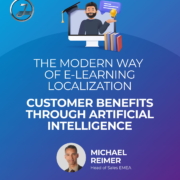The Modern Way of E-Learning Localization. Customer Benefits Through Artificial Intelligence
In today’s globalized world, e-learning has become an indispensable tool for businesses and educational institutions to efficiently and accessibly disseminate knowledge. However, to fully leverage its potential, tailored localization that considers the linguistic and cultural nuances of the target audience is essential. This is where Artificial Intelligence (AI) comes into play. This article introduces some of the key AI tools and highlights the benefits AI-driven e-learning localization can bring to customers.
1. Faster Time to Market
The traditional localization process can be time-consuming. AI-powered tools, such as machine translation, automatic transcription services, speech-to-text (STT) or text-to-speech (TTS) tools, significantly speed up the localization process. TTS is an AI technology that transforms written text into highly realistic spoken words. Not only is it much easier to arrange for AI narrators (e.g. for voice-over projects), but the 24/7 availability of AI voices also sets them apart from their human counterparts. By employing AI, e-learning content can be translated and adapted into multiple languages in significantly less time, enabling businesses to launch their training programs faster and maximize their global reach.
2. Cost Efficiency
The implementation of AI in the localization process can result in substantial cost savings. Automated translation tools reduce the need for human translators, allowing for scalability while maintaining low costs. This means companies can obtain high-quality localized content at a fraction of the cost and time associated with traditional methods.
3. Consistent Quality
AI-driven localization tools utilize advanced algorithms and machine learning to deliver consistent translations and culturally adapted content. These tools analyze large volumes of text and provide context-aware translations, ensuring the consistency and quality of the content. The algorithms continuously improve through learning and adaptation to new data, leading to increasingly accurate and relevant outputs.
4. Scalability
Global companies often require localization in many languages and even dialects. AI enables the rapid and efficient scaling of content into numerous languages without compromising quality. This is particularly advantageous for large organizations with extensive e-learning libraries that require regular updates.
5. Personalization and Adaptability
AI can provide deep analysis of user data to create personalized learning experiences. By integrating AI into e-learning localization, content can be customized not only linguistically but also culturally. This enhances the relevance and effectiveness of learning materials for different target groups. Adaptive learning platforms can also adjust to individual learning progress and preferences, thereby increasing the overall effectiveness of the learning process.
6. Enhanced User Experience
A well-localized e-learning platform offers users a more intuitive and enjoyable learning experience. AI can help design user interfaces, graphics, and interactive elements that are culturally relevant and engaging. This results in greater user satisfaction and improved learning outcomes.
Conclusion
The incorporation of AI into e-learning localization offers numerous benefits to customers. From faster and more cost-effective processes to consistent quality and high scalability, to personalized and culturally relevant learning content, AI is revolutionizing the way e-learning content is delivered globally. By leveraging these technologies, organizations can more effectively implement their global learning strategies and deliver a superior user experience.
The most recent feedback from a range of companies across the process industry indicates a growing demand for e-learning localization. There is a cautious optimism for business growth in 2024 and 2025, following two years of stagnant or even declining business. However, this optimism is contingent upon the planned use of cost and time savings to offset upcoming expenses. This is precisely where AI can demonstrate its business value.
By strategically employing AI in e-learning localization, companies can not only better serve their international markets, but also significantly boost learner motivation and success.
Janus Worldwide is an experienced global LSP and has delivered numerous localization projects in the e-learning sector over the last 28 years. Our localization team can translate your ready-made content, regardless of the platform you use, helping you gain exposure and brand recognition by reaching new audiences globally. Our in-depth expertise guarantees accurate, fluent and culturally appropriate localized content, provided by either human translators or state-of-the-art translation engines. We offer customized machine translation with post-editing and work with all the major engines (professional versions) on the market, so we are sure to find the perfect fit for your domain and language combination. Janus Worldwide has all the linguistic and technical know-how to deliver comprehensive localization of your e-learning program. If you’re looking for a localization partner, feel free to contact us.






